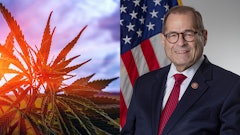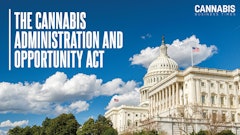DENVER (August 31, 2017) — The Cannabis Business Alliance (CBA) has released a statement in response to a recent report by anti-legalization organ SAM that attempts to claim that states that provide legal cannabis have failed to comply with the Cole Memo, according to a press release.
“States such as Colorado diligently uphold the responsibilities outlined in the Cole Memo and are working stringently to advance regulatory and compliance frameworks as a blueprint for other states that have seen the benefits of removing cannabis profits from the pockets of drug cartels and into schools and public health programs,” said Kevin Gallagher, Executive Director of the Cannabis Business Alliance. “Colorado is doing it right, and policymakers in states that have not yet come online are watching the Centennial State closely as a successful model for stimulating local economies while keeping constituents safe. SAM’s frivolous claims are just another prohibitionist attempt to halt the positive strides of an industry that has been proven to be an economic force in states where marijuana is legal,” Gallagher said.
Colorado’s cannabis industry has taken every precaution to ensure public health and safety, and statistics verify the state’s overwhelming success. Legalization of adult-use marijuana has not encouraged crime. In fact, Colorado's property crime rate fell by 5 percent between 2012 and 2015. Since 2009, both property and violent crime rates have fallen by 3 percent and 6 percent respectively. Legal cannabis has not resulted in an increase in youth use. A report from Substance Abuse and Mental Health Services Administration (SAMHSA) released in December 2016 found teen marijuana use fell sharply in Colorado in the years 2014 and 2015, after the opening of that state's recreational marijuana market, federal survey data show, confirming that instituting a legal cannabis industry reduces youth access, similar to alcohol regulations. According to an NIH report also released December 2016, marijuana use declined among 8th and 10th graders and remains unchanged among 12th graders compared to 2011, despite the changing state marijuana laws and past-year use of marijuana is at its lowest level in more than two decades among 8th and 10th graders. Organizations such as the Marijuana Education Initiative (MEI) have developed cannabis specific educational curriculum with a progressive and sensible approach to prevention and intervention. Since 2015, the MEI has worked directly with schools and students to promote a balanced and informed understanding of the effects of youth marijuana consumption.
The SAM report claims that “businesses target many of the marijuana products they sell toward kids, such as pot candies, cookies and ice cream.” However, Colorado’s rules for infused products mandate that the products cannot be shaped like animals or be in packaging designed to appeal to children. As of October 1, 2016, regulations also require all packaging as well as cannabis-infused products be marked with a “Universal Symbol” - a diamond enclosing the notations “!THC” or “!THCM”.
“Between child-resistance, prohibited advertising of cartoon characters, opaque packaging, and warning statements, Colorado infused products manufacturers are doing more than any other industry to make edibles less appealing and accessible to children,” Gallagher added. “Additionally, when a child does end up in a hospital due to accidental ingestion, it is more likely from edibles that were homemade by the parents, rather than edibles that were purchased in a legal dispensary and provided in child proof packaging. CBA stresses that parents should treat their cannabis as they would any other product that should not be accessible to children under the age of 21: lock it up and keep it out of sight.” Legal cannabis products are less likely to be accidentally ingested by kids than dish detergent packets, diaper rash cream, and even alcohol-infused chocolates. With more than five million infused product units sold each year and diminishing cases of accidental ingestion, the industry feels strongly that it is headed in the right direction. Colorado law mandates that children under the age of 21 are not allowed to step foot into a dispensary, unlike drug dealers who do not card their customers, and expose under age children to black market marijuana as well as deadly drugs such as heroin and designer drugs that are killing youth at an alarming rate. CBA fully supports full enforcement against black market marijuana operations.
Colorado has one of the country’s fastest growing economies, due in part to the legalization of marijuana. Colorado marijuana tax revenues greatly exceed original estimates of $70 million per year. Collections of $56 million in 2014 grew to $113 million in 2015. In 2016, the state reported roughly $1.1 billion in legal sales with over $200 million collected in tax revenue. Marijuana tax money has been used to improve a wide range of community programs and services, funding everything from school construction and public health and law enforcement to substance abuse prevention and fighting homelessness. As of January 2017, more than 23,000 people in Colorado now have full-time jobs because of the legalized marijuana industry, and Colorado’s unemployment rate has consistently posted at around 2.3 percent, often ranking the lowest in the country, and the lowest rate in Colorado since at least 1976.
“It is important that states take a thoughtful approach to marijuana taxation. If the taxes are too high, the black market flourishes, too low and the state misses significant revenues for public priorities. Colorado leads by example, taking power and money out of the hands of drug cartels and putting funds directly into state coffers,” Gallagher continued.
The SAM report also attempts to falsely link legalized marijuana with an increase in traffic incidents. “There is no clear evidence linking legalized marijuana to an increase in traffic incidents or fatalities in Colorado,” Gallagher said. “Prior to 2014, proper coding did not designate cannabis use in traffic incidents, and this issue persists even to this day, with many studies lumping cannabis use with prescription and illicit drugs such as opioids, and there are no standards for testing crash victims.”
While opposition groups like SAM aim to bring the enormous benefits of marijuana to a screeching halt, legalized cannabis continues to offer unparalleled medicinal options for patients including veterans suffering from PTSD, as well as women--who experience PTSD exponentially more than men--often as a result of domestic abuse. Cannabis has also been effective for children with debilitating conditions such as epilepsy and spastic quadriplegic cerebral palsy. Pulling back in any way would not only prohibit those who need marijuana most from getting it, but also go against the will of the American people.
More Americans are in favor of legalized marijuana than ever before. The latest Harvard-Harris Poll survey found that 49 percent of Americans believe marijuana should be legalized for both medical and recreational use and 37 percent believe marijuana should be legalized for medicinal purposes only, meaning that 86 percent of respondents support legalization in some form. Only 14 percent of respondents believe marijuana should be illegal.
Legal marijuana can also help to address the opioid epidemic, which has recognized by the current administration as a widespread national epidemic. The opioid epidemic kills 91 Americans every day, according to the Centers of Disease Control. Fortunately, a wealth of new research points toward cannabis as a potential solution to prescription painkiller addiction. A study published in 2014 in the journal JAMA found that states with legal medical marijuana experienced a nearly 25 percent drop in deaths from opioid overdoses, compared to states that do not have legal medical marijuana.
“CBA maintains that cracking down on legal cannabis businesses merely pushes a safe, regulated, taxable industry with professionally produced, lab-tested products back into the black market. We highly encourage policy makers in emerging states to speak directly with people involved in Colorado’s cannabis industry regarding regulatory and compliance framework,” Gallagher concluded.
For more information or to schedule an interview, please contact Shawna McGregor at 917-971-7852 or [email protected].
“States such as Colorado diligently uphold the responsibilities outlined in the Cole Memo and are working stringently to advance regulatory and compliance frameworks as a blueprint for other states that have seen the benefits of removing cannabis profits from the pockets of drug cartels and into schools and public health programs,” said Kevin Gallagher, Executive Director of the Cannabis Business Alliance. “Colorado is doing it right, and policymakers in states that have not yet come online are watching the Centennial State closely as a successful model for stimulating local economies while keeping constituents safe. SAM’s frivolous claims are just another prohibitionist attempt to halt the positive strides of an industry that has been proven to be an economic force in states where marijuana is legal,” Gallagher said.
Colorado’s cannabis industry has taken every precaution to ensure public health and safety, and statistics verify the state’s overwhelming success. Legalization of adult-use marijuana has not encouraged crime. In fact, Colorado's property crime rate fell by 5 percent between 2012 and 2015. Since 2009, both property and violent crime rates have fallen by 3 percent and 6 percent respectively. Legal cannabis has not resulted in an increase in youth use. A report from Substance Abuse and Mental Health Services Administration (SAMHSA) released in December 2016 found teen marijuana use fell sharply in Colorado in the years 2014 and 2015, after the opening of that state's recreational marijuana market, federal survey data show, confirming that instituting a legal cannabis industry reduces youth access, similar to alcohol regulations. According to an NIH report also released December 2016, marijuana use declined among 8th and 10th graders and remains unchanged among 12th graders compared to 2011, despite the changing state marijuana laws and past-year use of marijuana is at its lowest level in more than two decades among 8th and 10th graders. Organizations such as the Marijuana Education Initiative (MEI) have developed cannabis specific educational curriculum with a progressive and sensible approach to prevention and intervention. Since 2015, the MEI has worked directly with schools and students to promote a balanced and informed understanding of the effects of youth marijuana consumption.
The SAM report claims that “businesses target many of the marijuana products they sell toward kids, such as pot candies, cookies and ice cream.” However, Colorado’s rules for infused products mandate that the products cannot be shaped like animals or be in packaging designed to appeal to children. As of October 1, 2016, regulations also require all packaging as well as cannabis-infused products be marked with a “Universal Symbol” - a diamond enclosing the notations “!THC” or “!THCM”.
“Between child-resistance, prohibited advertising of cartoon characters, opaque packaging, and warning statements, Colorado infused products manufacturers are doing more than any other industry to make edibles less appealing and accessible to children,” Gallagher added. “Additionally, when a child does end up in a hospital due to accidental ingestion, it is more likely from edibles that were homemade by the parents, rather than edibles that were purchased in a legal dispensary and provided in child proof packaging. CBA stresses that parents should treat their cannabis as they would any other product that should not be accessible to children under the age of 21: lock it up and keep it out of sight.” Legal cannabis products are less likely to be accidentally ingested by kids than dish detergent packets, diaper rash cream, and even alcohol-infused chocolates. With more than five million infused product units sold each year and diminishing cases of accidental ingestion, the industry feels strongly that it is headed in the right direction. Colorado law mandates that children under the age of 21 are not allowed to step foot into a dispensary, unlike drug dealers who do not card their customers, and expose under age children to black market marijuana as well as deadly drugs such as heroin and designer drugs that are killing youth at an alarming rate. CBA fully supports full enforcement against black market marijuana operations.
Colorado has one of the country’s fastest growing economies, due in part to the legalization of marijuana. Colorado marijuana tax revenues greatly exceed original estimates of $70 million per year. Collections of $56 million in 2014 grew to $113 million in 2015. In 2016, the state reported roughly $1.1 billion in legal sales with over $200 million collected in tax revenue. Marijuana tax money has been used to improve a wide range of community programs and services, funding everything from school construction and public health and law enforcement to substance abuse prevention and fighting homelessness. As of January 2017, more than 23,000 people in Colorado now have full-time jobs because of the legalized marijuana industry, and Colorado’s unemployment rate has consistently posted at around 2.3 percent, often ranking the lowest in the country, and the lowest rate in Colorado since at least 1976.
“It is important that states take a thoughtful approach to marijuana taxation. If the taxes are too high, the black market flourishes, too low and the state misses significant revenues for public priorities. Colorado leads by example, taking power and money out of the hands of drug cartels and putting funds directly into state coffers,” Gallagher continued.
The SAM report also attempts to falsely link legalized marijuana with an increase in traffic incidents. “There is no clear evidence linking legalized marijuana to an increase in traffic incidents or fatalities in Colorado,” Gallagher said. “Prior to 2014, proper coding did not designate cannabis use in traffic incidents, and this issue persists even to this day, with many studies lumping cannabis use with prescription and illicit drugs such as opioids, and there are no standards for testing crash victims.”
While opposition groups like SAM aim to bring the enormous benefits of marijuana to a screeching halt, legalized cannabis continues to offer unparalleled medicinal options for patients including veterans suffering from PTSD, as well as women--who experience PTSD exponentially more than men--often as a result of domestic abuse. Cannabis has also been effective for children with debilitating conditions such as epilepsy and spastic quadriplegic cerebral palsy. Pulling back in any way would not only prohibit those who need marijuana most from getting it, but also go against the will of the American people.
More Americans are in favor of legalized marijuana than ever before. The latest Harvard-Harris Poll survey found that 49 percent of Americans believe marijuana should be legalized for both medical and recreational use and 37 percent believe marijuana should be legalized for medicinal purposes only, meaning that 86 percent of respondents support legalization in some form. Only 14 percent of respondents believe marijuana should be illegal.
Legal marijuana can also help to address the opioid epidemic, which has recognized by the current administration as a widespread national epidemic. The opioid epidemic kills 91 Americans every day, according to the Centers of Disease Control. Fortunately, a wealth of new research points toward cannabis as a potential solution to prescription painkiller addiction. A study published in 2014 in the journal JAMA found that states with legal medical marijuana experienced a nearly 25 percent drop in deaths from opioid overdoses, compared to states that do not have legal medical marijuana.
“CBA maintains that cracking down on legal cannabis businesses merely pushes a safe, regulated, taxable industry with professionally produced, lab-tested products back into the black market. We highly encourage policy makers in emerging states to speak directly with people involved in Colorado’s cannabis industry regarding regulatory and compliance framework,” Gallagher concluded.
For more information or to schedule an interview, please contact Shawna McGregor at 917-971-7852 or [email protected].
























